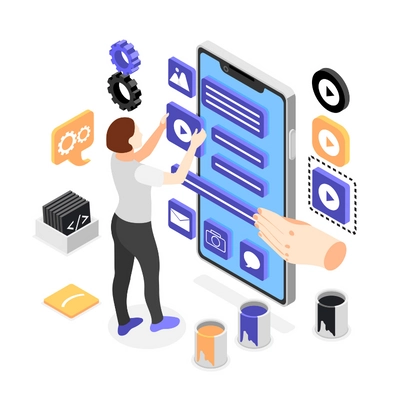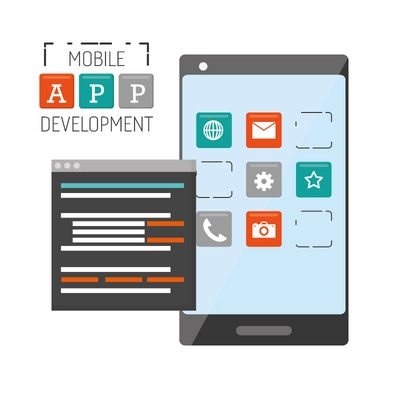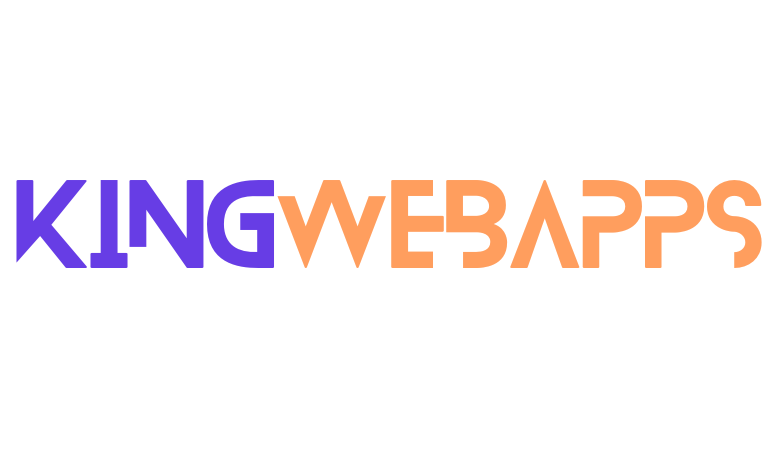Developmentor Hybrid and Multiplatform Apps that allow you to reach all platforms at an affordable price
What are Hybrid and Cross-Platform Applications and what are their characteristics?
The cross-platform and hybrid apps are mobile applications that are created using web technologies such as Html, css and JavaScript, and then wrapped in a native layer that allows the app to run on multiple platforms like iOS and Android.
These types of applications act like native apps (with their limitations compared to native ones) but at a price minor thanks to using a single code base for all platforms. A hybrid app offers flexibility, adaptability and results at a lower price for your company.
The 5 Most interesting features of cross-platform app development for your company:
The main characteristics that make a hybrid application a very interesting option for your company are the following:
1. Native Wrapper: Hybrid apps are wrapped in a native layer that allows the app to run on different mobile platforms like Android and iOS simultaneously. Ultimately, the app presents itself as a native app but with a look and feel similar to a native app.
2. Web technologies: Hybrid apps are based on web technologies such as HTML, CSS and JavaScript, developers use these technologies to design the user interface and business logic of the application. This has several advantages; Firstly, we depend on less specialized professionals than if it were knowledge of a particular operating system, thereby reducing costs. Secondly, this translates into greater flexibility and more agility when programming the app.
3. Access to native functions (with limitations): Hybrid and cross-platform apps can access some of the mobile platform's native features, such as the camera and geolocation, through plugins. However, they cannot access all native features, which can limit the functionality of the application.
4. Faster development: Hybrid app development is faster compared to native app development as the same code can be reused for multiple mobile platforms.
5. Cost savings: Cross-platform and hybrid app development is cheaper priced than native app development as it takes less time and effort to develop a single app that can run on multiple platforms.
In short, a multiplatform app will boost your business by improving processes, increasing traffic, Recognition of brand, providing greater engagement I entertainment, generating sales at a cheaper price, faster and easier to maintain.

What are the main benefits, advantages and disadvantages of hybrid and cross-platform applications?
The hybrid and cross-platform apps they have so much advantages as disadvantages, offering different benefits especially for companies with specific cases. Here we present some of the main disadvantages and advantages of the applications hybrid and native:
Advantages
1. Price: Hybrid and cross-platform apps are cheaper compared to native apps as the same code can be used for different platforms, reducing the overall development cost.
2. Rapid development: A cross-platform and hybrid app can be developed more quickly, since the same code can be used for different platforms. This allows companies to iterate their app much faster and launch it to the market sooner, gaining a competitive advantage.
3. Easy maintenance: Maintaining a hybrid app is easier than native apps since there is only a single code base to maintain. This also reduces long-term maintenance costs.
4. Wide audience: These types of non-native applications can reach a broader audience because they can run on different mobile platforms, allowing companies to reach more users without having to develop an application for each platform.
5. Easier Updates: Hybrid and cross-platform app updates are easier because a single code base can be updated, allowing businesses to deploy updates more quickly.
Disadvantages
1. Performance: The performance of hybrid and cross-platform apps can be lower than native apps because they run on an extra layer that can slow down the app.
2. Limited native features: A hybrid app may have limited access to the native features of the mobile platform, which may limit the functionality of the app.
3. Lower quality of user experience: The quality of the user experience may be lower in a cross-platform app, unlike native apps, they cannot offer such a personalized user experience.
4. Difficulty in integrating native elements: Sometimes it can be difficult to integrate native platform elements into non-native apps, for example iOS or Android design elements.
What are the different types of frameworks and programming languages used to create an optimal hybrid and cross-platform app?
flutter
flutter is an open source mobile application development framework created by Google that uses the Dart programming language. Flutter focuses on building high-quality, fast, hybrid and cross-platform mobile applications with an attractive user interface.
ionic
ionic is a hybrid application development framework that uses web technologies such as HTML, CSS and JavaScript. It is based on Angular, a popular JavaScript framework, and allows the creation of applications for multiple platforms.
ReactNative
ReactNative is a hybrid mobile application development framework from Facebook, which uses the JavaScript programming language. React Native allows developers to create apps for iOS and Android using a set of predefined components, and focuses on creating apps with a native user experience.
Xamarin
Xamarin is a mobile application development platform that uses the C# programming language and Microsoft's .NET framework. It allows developers to create applications for iOS, Android and Windows Phone, using a common code base for all platforms.
What are the key differences between hybrid mobile app development and native apps?
The main difference between mobile application development hybrid and applications native lies in how applications are built and run:
1. Technologies used: Native apps are developed using platform-specific programming languages, be it Objective-C or Swift for iOS or Java or Kotlin for Android. Instead, hybrid apps are built with web technologies, such as HTML, CSS, and JavaScript. Consequently, specific knowledge, qualified personnel, cost and execution time vary in favor of cross-platform apps.
2. User experience: Native apps typically offer a smoother and more native user experience compared to hybrid apps as they are designed specifically for each platform. Hybrid apps often have limitations when it comes to user experience, especially when it comes to animation and performance.
3. Cost and development time: Hybrid apps can be cheaper and faster to develop than native apps, largely because much of the code base can be reused for multiple platforms. Native apps, on the other hand, can be priced higher and take more time to develop as separate versions must be created for each platform.
4. Access to device functions: Native apps have full access to all device features, for example, camera and sensors. In contrast, hybrid apps have limited access to device functions through APIs.
In summary, the native apps They typically offer a smoother, more native user experience (see here for more information on native development for Android and iOS), while the hybrid apps They are cheaper and faster to develop. Choosing one or the other will depend on the specific needs of your project.

Which is better, hybrid mobile development or web application?

The choice between a hybrid mobile development and one Web Application It will depend on the specific needs of each project. Below are some considerations to help you decide which option is most appropriate:
1. User experience: If a native user experience is needed, that is, an application that feels as if it is part of the platform it runs on, then hybrid development may be the best option. Web apps may not offer the same “native” feel as a mobile app.
2. Device functionalities: If access to some functionalities of the mobile device such as the camera or sensors is needed, then cross-platform development may be the best option (although it has limitations compared to complete native development). Web applications may have limitations in the device functionalities that can be accessed.
3. Development times and price: In general, a web application has shorter development times than a cross-platform app. The same happens with the price, although the choice between one or the other should be due more to the needs of the project than focusing solely on development times and price.
4. Accessibility and compatibility: Web applications are accessible from any web browser, making them very useful for reaching a wide audience. Additionally, web applications are compatible with a wide variety of devices and operating systems. Hybrid mobile apps, on the other hand, are limited to the platforms for which they have been developed. As a negative point against web apps, we can say that an internet connection is necessary to access them.
In short, if you need a native user experience and access to device functionalities, opt for a hybrid app may be the best option. If you have a limited budget and need a shorter development time, or need to reach a broad audience across a wide variety of devices and operating systems, a Web Application may be the best option.
Why hire kingwebapps like your multiplatform app development company?
Company I develop hybrid applications with more of 2100 fulfilled projects.
Creators of all types of multiplatform website since more than 15 years. Awarded as one of the best Hybrid and Multiplatform Mobile Apps companies
Agency specialized in developing multiplatform mobile applications with a focus ASO Online Marketing to position your App ahead of your competition
Cross-platform application development tailored for all sectors. Hybrid Mobile Applications for companies SME, Scaleup, Startup and Big companies








Examples of Multiplatform and hybrid applications by typology and sectors
These are some examples of types of hybrid and cross-platform applications, both by typology and by sectors in which we develop apps. For any project, idea or sector query in particular, contact us to discuss your objectives without obligation.
Productivity Applications
Hybrid productivity apps are used to manage tasks, organize calendars, and take notes. Examples of hybrid productivity apps include Evernote, Trello, and Asana.
E-Commerce Applications
Hybrid e-commerce apps are very popular because they allow users to purchase products and services from anywhere and at any time. Examples of hybrid e-commerce applications include Amazon, eBay, and Alibaba as the most popular ones.
Travel, Tourism and Restaurant Applications
Multiplatform travel, tourism or restaurant apps are used to book flights, hotels and tourist activities, dining, etc. Examples of hybrid travel apps include Airbnb, Booking.com and Expedia and some of the most popular restaurant chains in the world.
Applications of Finance
Hybrid finance apps are used to manage personal finances, make transactions, and track expenses. Examples of hybrid finance apps include PayPal, Venmo, and Mint.
Social Networking Applications
Hybrid social media apps are very common and are used to share content and connect with friends and followers on various platforms. Examples of hybrid social media applications include Tiktok, Youtube, Facebook, Instagram, and Twitter.
Applications of Messenger service
Hybrid messaging apps are used to send text, voice, and multimedia messages to other users in real time. Examples of hybrid messaging apps include WhatsApp, Telegram, and Viber.
Frequently Asked Questions about Hybrid and Cross-Platform Application Development
What is the price of developing a hybrid and cross-platform application?
He price to develop a cross platform application and hybrid can vary widely depending on several factors; the complexity of the application, the level of personalization required, the time of development and experience of the development team.
Additionally, the price will also depend on the development approach used. For example, if you use an open source development framework such as ReactNative either ionic, he cost will be relatively low compared to custom development using native technologies such as Swift for iOS and Java for Android.
In general, the price of a development of hybrid app either multi platform can range from few thousand euros to tens of thousands of euros and can vary significantly depending on the project and specific requirements. Therefore, it is important to obtain a detailed budget and project plan before starting app development.
How long does it take to build a cross-platform and hybrid app?
He time How long does it take to create one? cross-platform and hybrid app It depends on several factors; complexity of the application, the experience of the development team, the dedicated time to the development and choice of the platform and technologies developmental.
In general, the development of a hybrid and cross-platform application can take a few few weeks to several months, sometimes even more, depending on the scale of the project. The time required to develop a hybrid and cross-platform application may also depend on the amount of functionalities and features that you wish to include in the application.
Additionally, it is important to note that the development process is not limited to creating the application itself, but also includes tests and tests, corrections of errors and settings to ensure the app works properly on multiple platforms.
In summary, the time required to develop a cross-platform application can vary significantly depending on the specific project and requirements, but in general, it can take from a few weeks to several months.
Where do you offer your hybrid and cross-platform application project services?
We develop cross-platform and hybrid mobile applications in United Kingdom.
How to choose the best development company cross-platform and hybrid applications?
Choosing the best cross-platform and hybrid app development company can be a challenging process as there are many factors to consider. Here are some tips to help you choose the best company for your project:
1. Experience and technical knowledge: Make sure the company has experience developing cross-platform and hybrid applications and has a team of experienced and qualified developers. Also make sure the company is familiar with the latest technologies and development tools.
2. Companies they work with: Check what type of companies they work with and if they fit for the type of project you are looking for.
4. Communication and support: Make sure the company has clear and open communication throughout the development process and offers ongoing support after the app launches.
5. Price: Compare the prices of several application development companies, as well as the speech and communication to make sure that the estimated price meets expectations and is really consistent. However, always remember that cost should not be the only deciding factor, as the quality of work and service are also very important.
6. Deadlines: Make sure the company can work within the deadlines you need so that there are no future misunderstandings and false expectations.
In summary, choosing the best cross-platform and hybrid application development company requires a careful evaluation of several factors before making such a relevant decision for our company.


